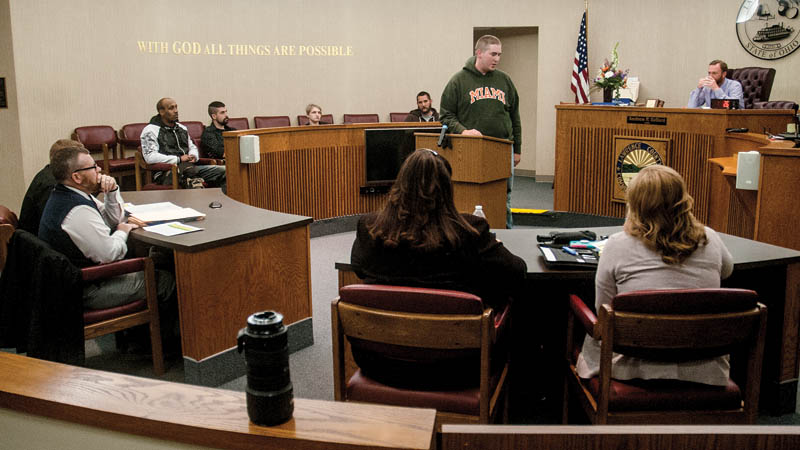OPIOID CRISIS: Drug courts have goal of rehabilitation
Published 7:58 am Thursday, May 3, 2018

- The first Lawrence County drug court session, called the Nexus Recovery Docket, which took place on Thursday, April 19 in Lawrence County Common Pleas Judge Andy Ballard’s courtroom.
Although it just recently got started, Lawrence County’s drug court, lead by county common pleas judge Andy Ballard, has already started making a difference in people’s lives.
Ballard named the drug court the Nexus Recovery Docket, and stated that the meaning of the word nexus stands for what the court is all about. Its first session, which took place on April 19, had five participants trying to improve their lives from being addicted or involved with drugs, three of which had to do with opioids.
Ballard said the drug court is only for low-level, non-violent offenders with either fourth or fifth-degree felonies, or first-degree misdemeanors.
Trending
“This is only for people who want to get their lives back on track and be productive members of society,” he said.
One of the first participants of the drug court is Ironton resident Briana Kinstler, who has been struggling with a heroin addiction after first using marijuana and cocaine when she was younger and having been in and out of jail since she was 18.
At the time of the first drug court session, Kinstler informed the court that she had been sober for a week, but was not currently in treatment. She added, however, that she worked full-time at Burger King, often upwards of 60 hours a week, to keep her out of trouble.
Ballard said as a result of her participation in the Nexus Recovery Docket, Kinstler is now in treatment for her addiction.
At the first session, Kinstler also informed the court that she has a 3-year-old son who she is trying to stay clean for in addition to herself.
Another participant of the Nexus Recovery Docket who has also been struggling with a heroin addiction is Christopher Goodwin, who said at the first session that he has overdosed on the drug on multiple occasions. He added that taking pills at 19 or 20 led him to heroin, and prior to that, he smoked marijuana and drank alcohol very early in high school.
Trending
Goodwin had been clean for 144 days at the first session, and said he was thankful for the opportunity of the drug court for its accountability and support.
Though the culmination of Ballard’s drug court just began, he said the process of obtaining a certified drug court was more than a year’s work of effort, which in addition to Ballard, included the efforts of STAR Community Justice Center, numerous community members and his staff.
In addition to Ballard’s Nexus Recovery Docket, Ironton Municipal Court Judge Kevin Waldo also recently began his drug court, called the Second Chance Drug Court Recovery Program.
Like Ballard’s drug court, Waldo’s is also for only those charged with low-level, non-violent and victimless crimes.
“At this point, we’ve established the opportunity for our participants to either have faith-based counseling, mental health counseling, drub rehabilitation counseling, occupational therapy or parenting skills counseling through our drug court,” Waldo said. “We have representatives for each of those, and we assess with each participant which one of those would be best suited for them.”
Waldo added that his drug court has met twice already and has three participants who have all struggled with some form of opioid addiction.
“We have them volunteer to accept the program, and then provide them with services to help them get back to being productive members of society,” he said. “The point is to bring them back up, and give them an opportunity to find a job.”
He added that one of the most important aspects of a drug court is to maintain close and consistent contact with each participant in order to keep them on track.
“If you give them any kind of room, especially when dealing with opioids, it often leads them back into their old habits that got them here in the first place,” he said. “There are consequences for failure or relapse, but there is also constant praise when they do well.”
Waldo said his drug court is currently in the process of gaining its certification from the Ohio Supreme Court, which could take up to four to six months, but that the program had to be up and running before that could take place.
Ballard’s Nexus Recovery Docket meets at 1:30 p.m. on the first and third Thursdays of each month in his courtroom at the county courthouse, while Waldo’s Second Chance Drug Court Program meets at 1:30 p.m. every Tuesday at the Ironton Municipal Court on the third floor of the Ironton City Center.
“A lot about the opioid crisis is negative,” Waldo said. “But drug courts do bring a positive approach to the issue.”





